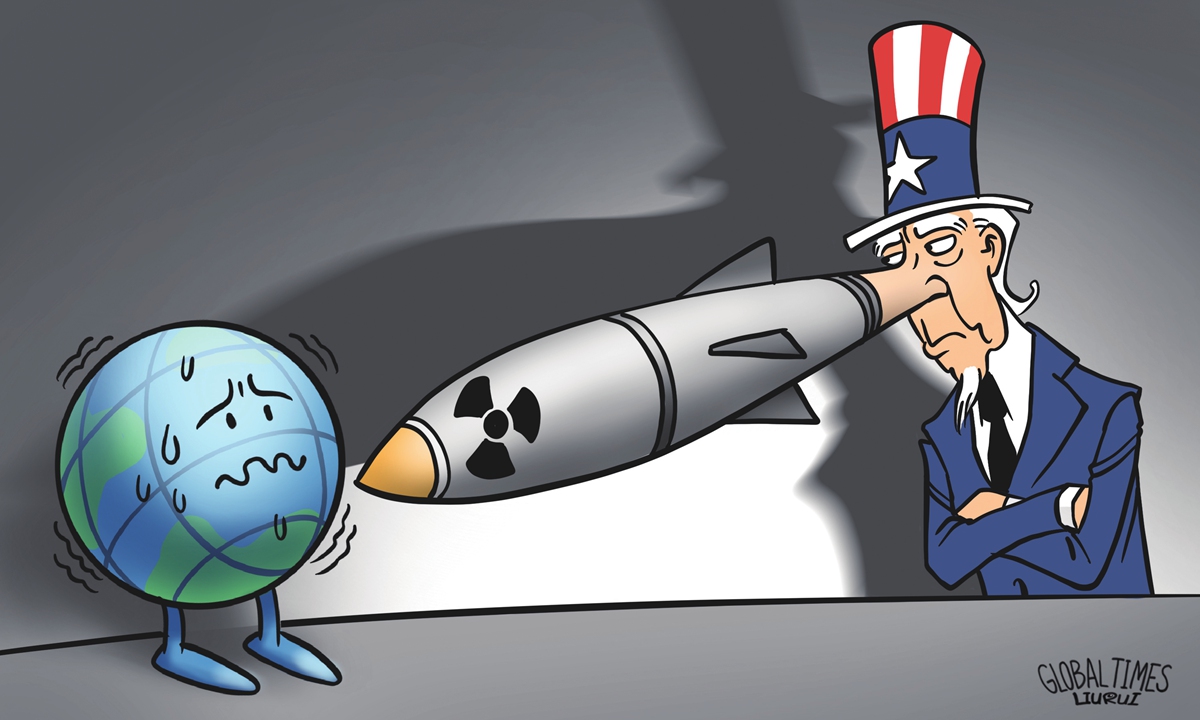
US nuclear power Illustration: Liu Rui/GT
Sensationalizing the threat of China is an old trick of Washington, especially when it seeks excuses to justify its hawkish policies.
The US Department of Defense on Wednesday released a 2021 Report on Military and Security Developments Involving China. The report speculates that, "The accelerating pace of the PRC's nuclear expansion may enable the PRC to have up to 700 deliverable nuclear warheads by 2027. The PRC likely intends to have at least 1,000 warheads by 2030."
The document is released at a time when Biden administration's Nuclear Posture Review (NPR) is anticipated to be concluded by the end of this year. The NPR is a legislatively-mandated review that establishes US nuclear policy, strategy, capabilities and force posture for the next five to 10 years.
With such pre-work, "the Biden administration can include more labels about China in its NPR to find more excuses for the US to continuously enhance its nuclear force, including developing new type of nuclear weapons," Wei Dongxu, a Beijing-based military analyst, told the Global Times.
Wild guessing
With the release of the Pentagon's report on China, it is clear that US nuclear policies won't see any big changes. The previously hot discussion on US' "no-first-use" policy is more of a two-man act - while Biden and some politicians are wooing more voters with the topic, the Pentagon still carries on developing nuclear power.
The figures in the Pentagon report are clearly guesswork. "By fabricating the numbers, the US is just making excuses for its military expansion, and for pulling China into nuclear disarmament. That's all," said Song Zhongping, a Chinese military expert and commentator.
For such purposes, Biden's NPR will highly likely continue hyping the nuclear threat from not only China, Song said. "The review may include so-called nuclear proliferation risks caused by North Korea and Iran. The US will take the opportunity to further emphasize the necessity to further enhance nuclear balance with China and Russia - so that the US will need to spend more money on strategic nuclear triad or even a quaternity," Song noted.
A game on interests
Former US president Donald Trump's NPR expanded the role of nuclear weapons as a retaliation method to biological or cyber attacks. Analysis suggested that using nuclear weapons in response to such attacks would be illegal under international law in virtually all circumstances.
In contrast, prior to assuming office, Biden has indicated to establish "sole purpose" of using nuclear weapons. And there are now arms control experts in Biden's team. Given the domestic political posture of the US, Biden's probable, relatively positive move on nuclear issues is in line with the constant game between the two parties in the US.
"Nonetheless, the US will not willingly give up its upper hands. Instead, it will make full use of the nuclear weapons as a strategic deterrence or even means of blackmail," Wei noted.
The large scale of nuclear weapons and accordingly high military expenditures have affected the development of conventional weapons in the US. Some in the country believe they don't need so many nuclear weapons. But many stakeholders think otherwise. "The military-industrial complex, US Navy and Air Force are all supporters of nuclear weapons, hoping to expand and upgrade nuclear arsenals," Wei said.
In 30 years following 2017, the US is forecast to spend upwards of $1.2 trillion to modernize and maintain its nuclear weapons. If new types of nuclear weapons are to be developed, much more money will be needed. It is obvious that the benefits to the entities involved will be enormous.
US' assertive deployment
In July 2021, an article entitled "Seven Deadly Misconceptions about Nuclear Deterrence" in the National Interest magazine read, "During the debate over the nuclear deterrent policy of the United States, the average person will hear many misconceptions about that policy advanced as 'statements of fact.' But these aren't facts, they are really just ideological tropes."
But in fact, the US' emphasis on China, Russia, North Korea and Iran in its nuclear policy is out of an ideological standpoint.
The US' judgment of the four countries and its hyping of the so-called threat posed by them reflect its perception is increasingly more confrontational.
This develops into a logical loop. When the US feels threatened, US judgment will be exacerbated by its own paranoia. Therefore, so will its response to the so-called threats. As such, these will probably end up with more assertive nuclear policies in the future.
The US has already expanded the role of nuclear weapons in its military retaliation playbook. This will increase the possibility of the US using tactical low-yield nuclear weapons in a strike, which, according to Song, are developed not for deterrence but actual use.
"If the US, through the NPR, resets the rules to enhance its influence, amplify its advantages and lower the threshold for the use of low-yield tactical nuclear weapons, the whole world must be on guard against the US' assertive deployment of nuclear weapons," Wei warned.
The author is a reporter with the Global Times. opinion@globaltimes.com.cn

